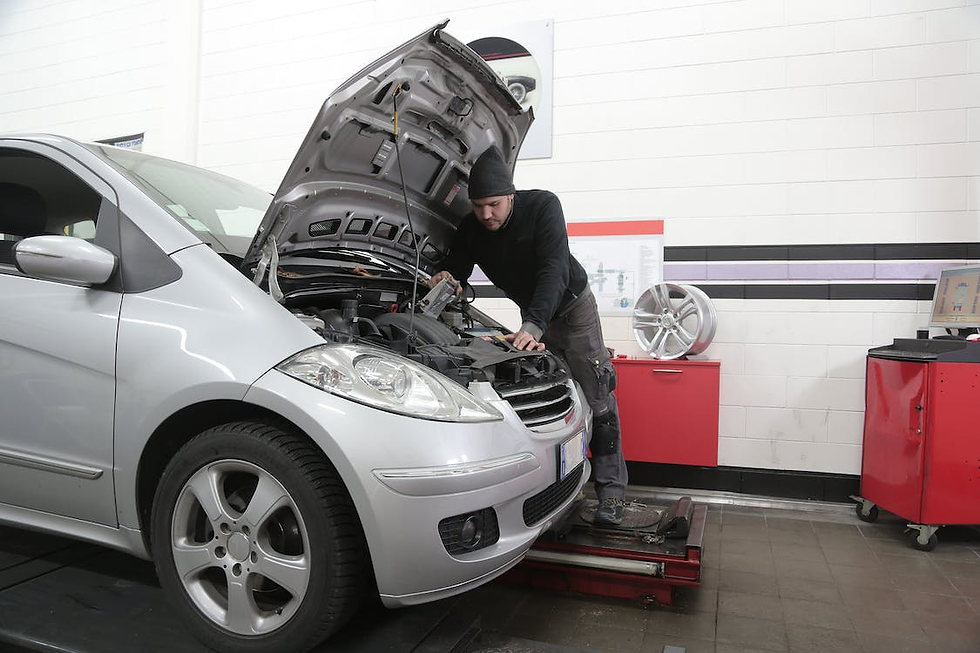How to Keep Your Car Running Smoothly Before Hurricane Season
- web service
- 3 days ago
- 4 min read
Hurricane season can be a nightmare for car owners. The heavy rains, flooding, and extreme winds can leave your vehicle compromised and unreliable. Did you know that an estimated 250,000 cars are destroyed every year due to flooding from hurricanes and tropical storms? That’s a staggering number, and the sad truth is, many of these vehicles could have been protected with the right preparation.
We all rely on our cars to get us safely from one place to another. When hurricane season approaches, it's essential to make sure our vehicles are in top condition to handle unpredictable conditions.
This guide will walk you through the most effective ways to storm-proof your vehicle and keep it running smoothly even when severe weather hits.
Why It’s Important to Prepare Your Vehicle for Hurricane Season
When hurricanes and tropical storms strike, they bring heavy rainfall, flooding, and flying debris. Cars that aren’t adequately prepared may experience severe damage or even become inoperable when you need them the most. Taking preventive steps is essential for your safety, your vehicle’s longevity, and avoiding costly car repairs down the road.
Regular Maintenance Is Key

Staying on top of regular maintenance is the best way to ensure your car is ready for whatever hurricane season throws at it. Here’s what to prioritize:
· Oil Changes: Keeping your engine well-lubricated can prevent damage from the stress of heavy driving conditions.
· Fluid Checks: Make sure all fluids, including brake fluid, coolant, and transmission fluid, are at their proper levels.
· Battery Inspection: Ensure your battery terminals are clean and secure. A weak battery can leave you stranded when you need your car the most.
· Brake Check: Make sure your brakes are responsive and in good condition. Wet roads increase stopping distances, so fully functional brakes are a must.
· Tire Inspections: Inspect for uneven wear, bald spots, and low tread. Replacing worn tires can significantly improve handling on wet roads.
Protect Your Tires
Having the right tires on your vehicle is essential during hurricane season. Old or damaged tires increase the risk of accidents on slippery, rain-soaked roads. Here’s how to keep your tires in good shape:
· Inspect Tire Pressure: Low tire pressure can decrease traction. Check your tire pressure regularly and keep it at the recommended levels.
· Check Tread Depth: Tires with inadequate tread are more likely to hydroplane. Consider replacing tires if they are excessively worn.
· Rotate Tires Regularly: Regular tire rotation helps ensure even wear and prolongs tire life.
Safeguard Your Engine and Electrical Components
Floodwaters are a vehicle’s worst enemy. Water entering your engine or electrical system can cause irreversible damage. To protect your car:
· Seal Vulnerable Areas: Make sure all seals, gaskets, and weather stripping are intact to prevent moisture from getting into sensitive components.
· Keep Air Filters Clean: Dirty air filters can impede your vehicle’s performance. Replace them if needed.
· Avoid Parking in Low-Lying Areas: If flooding is expected, park your car on higher ground or in a garage.
Emergency Kit Preparation
Being prepared for the unexpected is essential. Put together an emergency kit that includes:
· Jumper cables
· Flashlight and batteries
· First-aid kit
· Roadside flares or reflective triangles
· Basic tools (wrenches, screwdrivers, pliers)
· Tire repair kit and air pump
· Portable phone charger
Car Hurricane-Proofing Tips
To minimize damage and keep your vehicle operational during hurricane season, consider these steps:
1. Waterproofing Electronics: Inspect critical electronic systems, such as your vehicle’s computer, sensors, and wiring. Ensure all connectors and sensitive areas are properly sealed to prevent water damage that could leave your car non-functional during a storm.
2. Applying Protective Coatings: Adding a fresh coat of wax to your vehicle creates a water-repellent barrier. This simple step helps prevent rust, corrosion, and damage to your car’s paint, especially when exposed to heavy rains and standing water.
3. Securing Loose Items: High winds can turn loose items into dangerous projectiles. Remove unnecessary items from your vehicle’s interior and secure external components like roof racks to minimize the risk of damage.
4. Fuel Up: Always maintain your gas tank at least half full. During hurricane season, power outages and supply chain disruptions can make finding fuel difficult. Keeping your tank topped off ensures you’re prepared to evacuate if necessary or power your vehicle when resources are scarce.

Test Your Vehicle’s Systems
Before hurricane season, it’s wise to test your car’s systems to make sure everything is functioning as it should.
· Lights and Signals: Make sure all lights, signals, and hazards are working correctly.
· Windshield Wipers: Replace worn wipers to maintain visibility during heavy rain.
· Heating and Air Conditioning: Ensure your HVAC system is functioning to prevent window fogging during storms.
Stay Prepared and Stay Safe
Hurricane season is unpredictable, but with the right precautions, you can keep your car running smoothly even when the weather takes a turn for the worse. From thorough maintenance to specific car hurricane-proofing techniques, taking the right steps now can save you significant trouble later.
At Platinum Wrench Auto Repair, we understand how important it is to have a reliable vehicle during hurricane season. Whether you need a battery check, brake inspection, or tire replacement services in Pinellas Park, our expert car mechanics are here to help. Contact us today to ensure your vehicle is ready to face the worst weather with confidence.




Comments